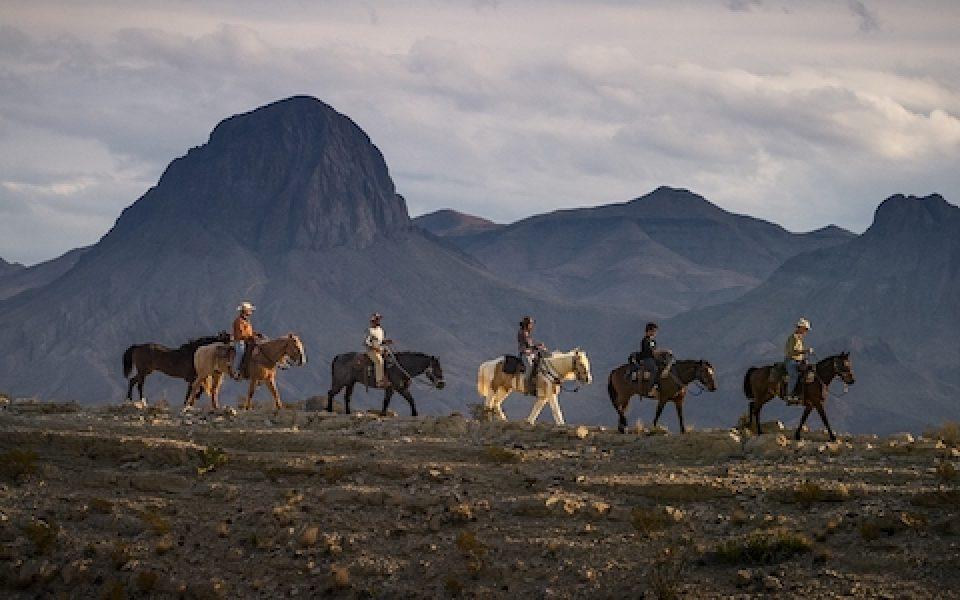Dir. Ben Masters, USA/Mexico, 2019, 99 min.
This documentary tracks a group of five friends — experts in their fields — as they travel from El Paso to the Gulf of Mexico on a 1,200-mile journey to document the border and investigate the looming impacts of a wall on the natural environment. They travel across gorgeous and rugged terrain by bicycle, mustang and canoe, at times carrying their bikes through thorny brambles with sheer rock faces on either side. They witness the discontinuous metal barriers already erected from Imperial Beach, Calif. laden with ice, up and down magnificent sand dunes; they witness the ocelots, tortoises and bird species that flourish in low-elevation, subtropical environments, and the rams and black bears that rely on crossing the river artery in a mountainous habitat on a daily basis in order to survive. They do not recognize artificial international boundaries.
The River and the Wall is a pleasure to watch because it overflows with the filmmakers’ joyful sense of adventure and reverence for wild landscapes most Americans know little about, not to mention the awe-inspiring cinematography that punctuates solemn moments highlighting the stark disconnect between rhetoric and border realities. Facts scroll across the screen as in any documentary, but it’s the impromptu riverside conversations with Mexican fisherman and interviews with ranchers whose land — 200,000 acres of some of the most productive farmland in the world — would be seized through eminent domain, that humanize the border “debate.” Their expert testimony underlines the objective absurdity of constructing a $30 billion, contiguous concrete wall on straight lines across levees and irrigation canals, sometimes miles inland from the twisting river, slicing up public land and stranding an estimated 1 million acres of private land.
The film is a remedy to misconceptions about the vast borderland, from topography to culture to industry, and sets the record straight: that illegal drugs are overwhelmingly smuggled through regulated ports of entry; that it is Americans’ consumer demand for those drugs that funnels an estimated $50 billion into cartels’ coffers each year, which they weaponize to hollow out civil institutions and further destabilize their regions; that most people who cross illegally are Central Americans fleeing civil instability, abject poverty and violence, not Mexicans; that since 2007, the unauthorized immigrant population in the United States has grown more via visa overstays than by illegal border crossings, which are down significantly.
Viewers walk away from The River and the Wall able to discuss the borderland — it’s precious wilderness and unique cultures — within new frameworks, and with a firmer understanding that the fight against a barrier wall is as much about protecting wildlife and stunning public lands as it is about reckoning with violent foreign policies and current abuses on US soil to move toward safeguarding human dignity.
The River and the Wall screens in Winston-Salem on Friday at 11 a.m. at Hanesbrands Theatre and Sunday at 1 p.m. at UNCSA Gold.
—LB
You may also enjoy these Riverrun 2019 reviews:
‘Santuario’: This locally tied documentary brings the immigration debate home as it follows Juana Luz Tobar Ortega, a Guatemalan woman who sought sanctuary in an unfamiliar Greensboro church in 2017 to avoid deportation.
Bei Bei: This documentary delves into the abortion debate by focusing on Bei Bei Shuai, a Chinese immigrant woman living in Indiana, who is facing two felony counts after her baby died when she committed suicide.
Find the full list of reviews here.
Join the First Amendment Society, a membership that goes directly to funding TCB‘s newsroom.
We believe that reporting can save the world.
The TCB First Amendment Society recognizes the vital role of a free, unfettered press with a bundling of local experiences designed to build community, and unique engagements with our newsroom that will help you understand, and shape, local journalism’s critical role in uplifting the people in our cities.
All revenue goes directly into the newsroom as reporters’ salaries and freelance commissions.


Leave a Reply